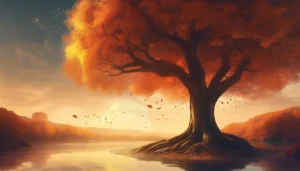In life, questions are like constant companions. They tug at us, filling quiet moments with whispers of doubt and curiosity. They push us to seek meaning, purpose, or a path forward. Questions like “What is my purpose?” or “Am I good enough?” can grow loud, tugging at us with a need for answers that feel impossible to grasp. It’s natural to want clarity, to seek answers that will put our minds at rest. But, often, the harder we chase, the more restless we feel, as if every answer only breeds more questions. So, what if we could find a way to live in harmony with these questions, finding peace even without knowing everything?
This journey isn’t about losing curiosity or disengaging. It’s about learning to hold questions gently, transforming our relationship with them so that, instead of being burdens, they become moments of wonder and opportunity.
Accepting Questions as Open Invitations
Sometimes, questions arise with a pressure to answer them right away, especially when they touch sensitive areas like our purpose, value, or future. A friend once shared how this urgency affected her deeply. Every day, she wondered, “Am I on the right path? What if I’m wasting my time?” The pressure of finding the “right” answers weighed on her, making her feel anxious, as if each day’s actions needed to prove something. It wasn’t until she learned to sit with these questions without the need for instant solutions that her outlook changed.
By seeing questions as open invitations rather than urgent problems, she found that her curiosity remained, but the tension faded. She began to approach life with gentler wonder, exploring her actions without the pressure to label them as “right” or “wrong.” Instead of feeling incomplete, she found herself more open to experience.
Observing Thoughts Without Getting Caught Up
Many people find peace by learning to watch their thoughts instead of getting entangled in them. Meditation and mindfulness are powerful tools here. Think of thoughts as clouds passing in a sky; you can observe them without chasing each one. A great example of this comes from the story of a writer who struggled with self-doubt. He’d lie awake at night wondering, “Will my work ever be enough? Will people understand me?” Each question felt like a weight he couldn’t put down.
But as he practiced observing his thoughts without attaching to each one, he noticed something remarkable. The questions didn’t disappear, but they lost their sting. He began to see them as part of a broader landscape of thoughts—some meaningful, some fleeting. This shift let him focus on writing rather than proving himself, allowing his creativity to flow more freely and reducing his inner turmoil.
Living the Question Instead of Trying to Solve It
Many of us are conditioned to treat life as a problem to be solved. But what if, instead, we could simply live each question? A teacher once advised her students, “Don’t try to figure out what your life purpose is. Instead, just live each day with kindness and curiosity.” For one student, this was a revelation. He had always wondered, “What’s my purpose?” and felt stuck, unable to answer it. But as he shifted focus to living each moment fully, he found that purpose started to reveal itself.
When he stopped demanding answers and focused on being present in each interaction and task, he discovered a sense of meaning that no single answer could have provided. Each moment became purposeful in itself, and he felt a new kind of peace—a freedom from the constant need to have it all figured out.
Transforming Questions into Explorations
Not every question needs a concrete answer. Sometimes, simply reframing a question can open up new pathways. Take the example of an artist who often found herself paralyzed by the thought, “What if my work doesn’t matter?” Rather than letting this question stifle her creativity, she decided to explore it: “How can I create something meaningful for myself?” Instead of focusing on whether others valued her work, she poured herself into her art, reconnecting with her love for the creative process. By shifting from an outcome-driven question to an exploration, she rediscovered joy and motivation.
Questions don’t have to trap us in doubt; they can guide us into actions that feel meaningful in the moment. By reframing her question, she stayed curious without getting stuck in her insecurities.
Trusting Life’s Flow
Often, questions come from a sense of wanting to control our circumstances. But learning to trust—whether it’s trust in yourself, life, or something larger—can bring immense peace. A man who once struggled with health anxieties shared how trust changed his life. Every symptom became a question: “What if this is something serious? Will I be okay?” He realized he was constantly waiting for reassurance that things would be alright, but no answer ever felt permanent.
He decided to shift his focus, learning to trust that he could handle life’s uncertainties. It didn’t mean he no longer cared about his health; he simply chose not to let each question spiral into fear. Trusting life allowed him to be present without the need to control every outcome, freeing him to engage fully in what mattered most.
Embracing the Gift of Uncertainty
Life, in all its beauty, is filled with mysteries that may never be fully understood. Rather than seeing this as a problem, we can embrace it as part of the gift of being alive. One philosopher once said that it’s the unanswered questions that keep us growing, reminding us that we are always part of something greater. Accepting that some questions may remain open forever can be deeply freeing, allowing us to appreciate the richness of each moment without needing it to fit a specific mold.
Imagine standing by a vast, calm lake. There are endless depths, and you may never explore every part of it, but that doesn’t take away from the lake’s beauty. Just as with life, we can appreciate it without needing every answer.
Living in Peace with Life’s Questions
Learning to relate to questions differently—seeing them as open invitations, observing them without attachment, living each day as an exploration—frees us from the need to solve everything. Rather than seeking answers as a means of escape, we find a way to live with questions as companions, guiding us gently through life without urgency or fear.
In letting go of the need for answers, we don’t lose curiosity. Instead, we gain a new way of engaging with life, grounded in peace, presence, and trust. As we step into this openness, we might just find that the beauty of life lies not in having every answer but in the journey of discovery itself.



